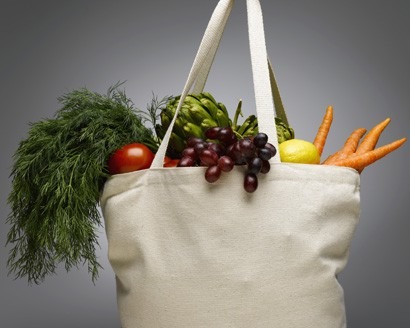Tote-Tally Gross Bacteria Is Probably In Your Reusable Tote Bag
We're willing to bet you don't wash your grocery totes — a study released this month revealed that only 15 percent of Americans do.
Here's another lovely statistic for you: A 2010 study found coliform bacteria — a type of bacteria found in our environment and, well, poop — in more than half of randomly tested totes carried by shoppers in Tucson, Ariz.; Los Angeles; and San Francisco. E. coli, the infamous culprit behind 73,000 cases of food poisoning each year in the United States, was detected in 12 percent of the bags. Grossed out yet?
"Bacteria levels found in reusable bags were significant enough to cause a wide range of serious health problems and even death," said Charles Gerba, a University of Arizona professor of soil, water, and environmental science and co-author of the 2010 study. "They are a particular danger for young children, who are especially vulnerable to foodborne illnesses."
Gerba's research, conducted by the University of Arizona and Loma Linda University in California, discovered that most shoppers didn't even realize they needed to wash their bags. Guess what? You definitely do. And you need to take additional precautions to avoid contamination of your food.
Home Food Safety — a public awareness campaign focused on food safety and established by the Academy of Nutrition and Dietetics and ConAgra Foods — and the University of Arizona recommend the following safety measures:
1. Sanitize your reusable bags with thorough washing — machine or hand-washing — with hot, soapy water. UA's Gerba recommended doing this about once a week, depending on how often you use the totes.
2. Wrap uncooked meat, poultry, and fish in individual plastic bags before placing them in the tote. This way you avoid possible contamination from leaky juices.
3. Who doesn't love color-coding? Pick one tote to always use for raw meat, poultry, and fish — fresh or frozen — and pick another tote for produce and ready-to-eat foods.
4. Do not — we repeat, do NOT — store the reusable bags in the trunk of the car, whether they contain food or not. The hot temperature in there means it's a nurturing home for bacteria; in fact, the UA study found that the large numbers of bacteria that tend to live in reusable bags can increase tenfold in a trunk within only two hours.
5. Don't use your reusable bags for other purposes, like carrying your books or your dirty gym clothes (ew).
6. Clean wherever you usually drop your totes when you get back from the grocery (e.g., kitchen counter or table) to prevent cross contamination.
7. Store the reusable bags in a clean, dry place.
— Melissa Valliant, HellaWella
More From HellaWella:
• Science vs. hype: Is panic over pink slime justified?
• Spicy salmonella rolls raise questions about fishy tuna
• Why a juice cleanse is a waste of your time (and money)
• Get your flu shot at Safeway and save on your next grocery buy!
